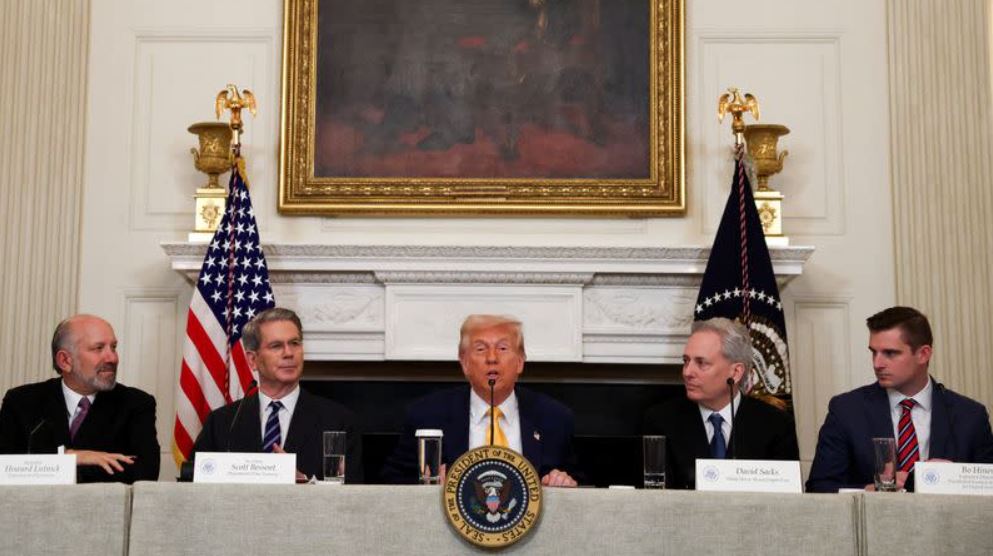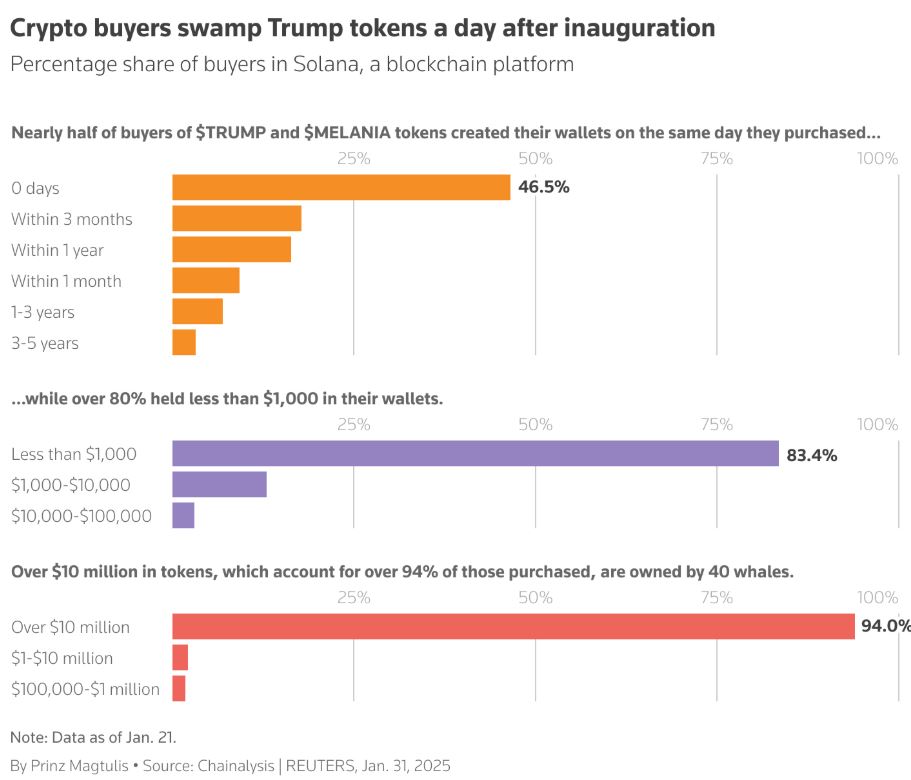
The cryptocurrency world is buzzing with news about World Liberty Financial (WLF), a project tied to the Trump family that has raised eyebrows and hundreds of millions of dollars. Launched in the fall of 2024, this venture promises to revolutionize finance through decentralized systems. Yet, as of March 31, 2025, it’s still in the early stages, with no public platform and a small team. However, recent developments have revealed that the Trump family has taken a dominant role in the company’s operations and financial gains. Here’s how the Trump family took charge of this crypto firm, what it means for investors, and why experts are questioning its structure.
A Rapid Fundraising Success
World Liberty Financial was introduced in late 2024, aiming to provide financial services using blockchain technology without relying on traditional banking institutions. Despite its ambitious mission, the project has yet to launch a fully functional platform. Nevertheless, in mid-March 2025, the company announced it had raised an impressive $550 million through the sale of governance tokens called $WLFI.
Most of these sales occurred after Donald Trump’s election victory in November 2024, highlighting a strong correlation between the project’s fundraising and political influence. While $WLFI tokens provide voting rights on project decisions, they cannot be traded, which raises concerns about their true financial value for investors.
Trump Family Takes Control
The Trump family’s involvement deepened over time. In January 2025, World Liberty updated its website, revealing a major shift. Folkman and Herro, the original co-founders, were no longer in control. Instead, an entity called WLF Holdco LLC took over, with DT Marks DeFi LLC—a company linked to Donald Trump—holding a 60% stake. Eric Trump, the president’s son, also joined WLF Holdco’s board. This change, unreported until now, gave the Trump family a firm grip on the project.
The financial stakes are huge. The Trump family now claims 75% of net revenues from token sales and 60% of future profits once the platform launches. Based on the $550 million raised, they’re entitled to about $400 million in fees. After the co-founders take their share, only 5%—roughly $27.5 million—remains for World Liberty to build its platform. Critics say this leaves little for actual development.

A Centralized Twist in a Decentralized World
For a DeFi project, World Liberty’s structure feels unusually centralized. A survey of the top five DeFi lending platforms shows most distribute governance tokens widely—to users, investors, or partners—and allow trading. World Liberty’s $WLFI tokens, however, stay locked with buyers. Experts from leading universities have pointed out that the structure effectively prevents public investors from gaining significant financial benefits. Experts like Jim Angel, a Georgetown University professor, question their value. “It’s hard to see any economic benefit for token holders,” he says. David Krause, a finance professor at Marquette University, adds that the setup “excludes public investors from meaningful financial participation.”
The White House passed questions to the Trump Organization, which didn’t respond. In January 2025, the Trump Organization placed Donald Trump’s assets in a trust managed by his children to avoid conflicts of interest. Still, the family’s dominance in World Liberty raises concerns about transparency and fairness.
Trump’s Expanding Crypto Influence
Donald Trump has positioned himself as the “crypto president,” advocating for the greater adoption of digital assets in the U.S. financial system. He has claimed that cryptocurrencies could enhance banking services and strengthen the U.S. dollar.
However, the Trump family’s involvement in crypto goes beyond political support. In addition to World Liberty, Trump-backed meme coins have reportedly generated over $349 million in fees for entities linked to him. Furthermore, in March 2025, a new company formed with Donald Trump Jr. and Eric Trump acquired a minority stake in a Bitcoin mining firm, American Bitcoin. Eric Trump is set to serve as the company’s chief strategy officer.
These ventures have sparked criticism from political opponents and financial ethics experts, who argue that Trump’s regulatory power could create conflicts of interest. Critics warn that foreign governments or wealthy individuals could use crypto investments to gain favor with the administration.

From Slow Sales to a Flood of Cash
World Liberty’s journey started small. By October 30, 2024—two weeks after token sales began—the project had raised just $2.7 million, per a U.S. regulatory filing. Then came Trump’s election victory on November 5, 2024. On November 25, Hong Kong-based crypto mogul Justin Sun invested $30 million, a sum World Liberty said was critical to kickstart operations. Sun, facing a paused U.S. securities fraud case, later boosted his stake to $75 million and became an advisor. His involvement sparked a surge in interest.
The real boom hit on January 19–20, 2025, during Trump’s inauguration. World Liberty raised nearly $300 million in two days, fueled by big buyers. Reuters found that 70% of the funds came from wallets spending at least $100,000, with over 50% from purchases of $1 million or more. Most buyers remain anonymous, but a few told Reuters they invested because of Trump’s name, betting on his influence to drive success.
How It All Began
The project’s roots trace back to Folkman and Herro, lesser-known crypto players with a mixed business history. They connected with the Trumps through Steve Witkoff, a New York real estate tycoon and Trump ally. In September 2024, Witkoff shared on a Trump-hosted podcast how his son introduced him to the duo. After hearing their pitch on DeFi’s potential, Witkoff arranged a meeting with Donald Trump and his sons, Eric and Donald Jr. The Trumps were hooked, saying, “Let’s go pursue it.”
Folkman and Herro brought experience from online ventures, some marked by legal disputes and unpaid debts. Folkman once ran seminars on dating, while Herro later pitched World Liberty as a way to democratize finance. Donald Trump Jr., meanwhile, has spoken about the family’s struggles with traditional banks after his father’s first term, framing crypto as a solution.
Trump’s Crypto Empire Expands
World Liberty isn’t the Trump family’s only crypto play. A meme coin tied to the president has raked in $349 million in fees, per Chainalysis. On March 30, 2025, Eric and Donald Jr. took a minority stake in American Bitcoin, a new bitcoin mining firm where Eric will serve as chief strategy officer. The company aims to go public, further tying the family to crypto’s rise.
Donald Trump, now dubbed the “crypto president,” has vowed to mainstream cryptocurrencies in the U.S. He argues they’ll strengthen the dollar and fix banking flaws. Critics, though, see risks. Ross Delston, a former banking regulator, warns that World Liberty’s tokens could be a way for foreign powers to funnel money to Trump, calling it “the perfect vehicle.”
A Questionable Business Model
While World Liberty has ambitious plans, its business structure raises doubts about its long-term viability. Unlike major DeFi platforms that distribute governance tokens to users or venture capitalists, World Liberty’s model heavily favors Trump-backed entities.
Additionally, governance token holders have no right to claim profits from the project, and any vote to change this policy would be invalid. This lack of financial incentives further diminishes the attractiveness of $WLFI tokens as an investment.
The Road Ahead
Despite skepticism, World Liberty continues to promote its future roadmap. The company claims it is working on three key products:
- A crypto lending and borrowing market
- A personal finance application
- A stablecoin (USD1) backed by U.S. Treasuries
The company has also partnered with Ondo Finance, a startup that tokenizes real-world assets such as U.S. Treasury bonds. However, the project’s slow progress and concerns about governance suggest that the road ahead may be challenging.
World Liberty Financial presents an intriguing case of cryptocurrency’s intersection with political power. While the project aims to democratize finance, its current structure raises questions about transparency, investor benefits, and regulatory oversight.
As the crypto industry continues to evolve, World Liberty’s success or failure could serve as a defining moment in the relationship between politics and decentralized finance. Whether it will fulfill its promise or remain a Trump family-dominated venture remains to be seen.























